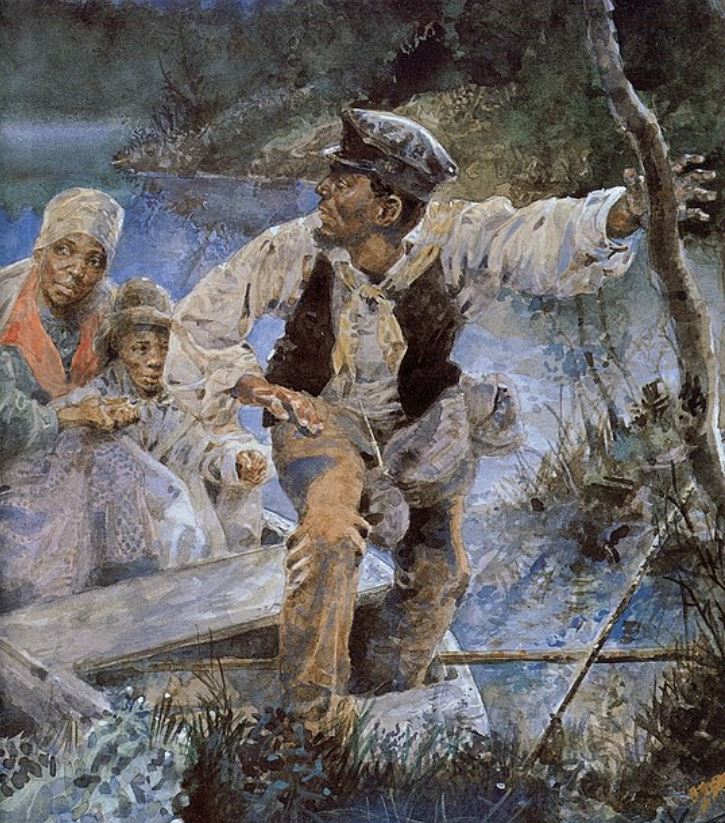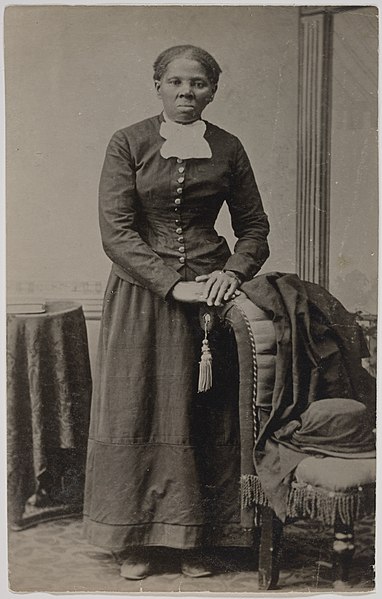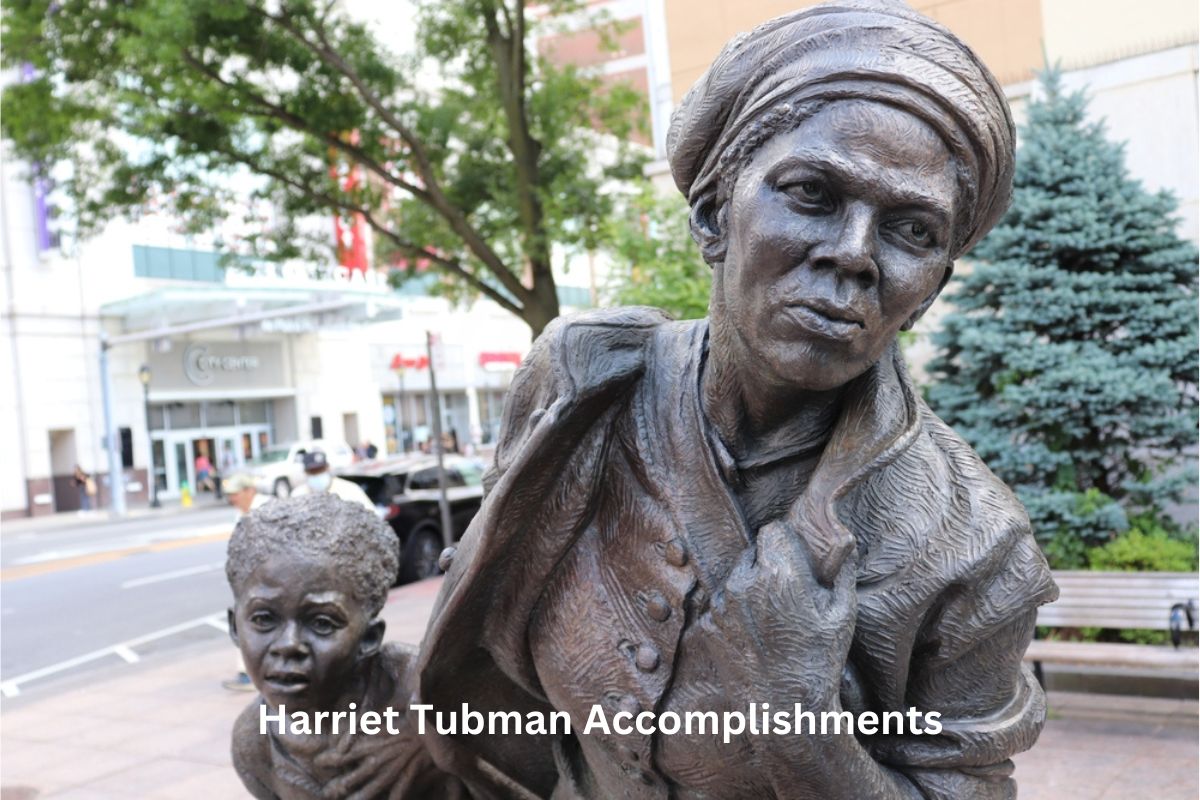Harriet Tubman, born into slavery in the early 1820s, emerged as a fearless abolitionist and political activist whose remarkable contributions profoundly impacted American history.
Her journey from enslavement to becoming the “Moses of her people” on the Underground Railroad, guiding hundreds to freedom, remains an enduring symbol of courage and determination.
Throughout her life, Tubman’s advocacy for civil rights, her service during the Civil War, and her dedication to humanitarian causes and women’s rights solidify her as an iconic figure whose legacy continues to inspire generations to stand up against oppression and fight for equality.
Accomplishments of Harriet Tubman
1. Led the Underground Railroad
Harriet Tubman was a key figure in the Underground Railroad, which was not an actual railroad but a clandestine network of safe houses, secret routes, and abolitionist supporters. Born into slavery in Maryland, she escaped to freedom in 1849, crossing state lines to Pennsylvania, a free state.

Despite her newfound freedom, she risked her life and freedom to return to the South multiple times to guide other enslaved individuals to freedom. She became known as the “Moses of her people” for leading these dangerous missions.
2. Guided around 300 enslaved individuals to freedom
Over the course of her missions on the Underground Railroad, Tubman made approximately 19 trips back into slave states to rescue enslaved individuals.
Also Read: Facts About Harriet Tubman
It is estimated that she personally led around 300 enslaved people, including friends, family, and strangers, to freedom in the North or Canada.
Tubman’s remarkable ability to navigate through dense forests, swamps, and hostile territories while avoiding slave catchers made her a legendary and highly sought-after conductor.
3. Advocated for the abolition of slavery
Throughout her life, Harriet Tubman was an outspoken advocate for the abolition of slavery. Her firsthand experience as an enslaved person fueled her determination to fight against this inhumane institution.
Also Read: Timeline of Harriet Tubman
Tubman worked alongside prominent abolitionists such as William Lloyd Garrison, Frederick Douglass, and John Brown. She used her experiences and stories from the Underground Railroad to raise awareness about the harsh realities of slavery and the need for its immediate abolition.
Harriet Tubman’s fearless determination to fight for the freedom of enslaved individuals and her dedication to the cause of abolition have left a lasting legacy.
Her actions inspired hope and courage in those seeking freedom, and she remains an enduring symbol of strength and resilience in the face of oppression and injustice.

4. Served as a nurse, cook, and spy during the Civil War
When the American Civil War broke out in 1861, Harriet Tubman saw an opportunity to contribute to the Union cause and fight for the end of slavery. She offered her services to the Union Army and worked as a nurse, cook, and laundress during the conflict.
Tubman’s experiences as a nurse and her knowledge of herbal medicine from her time as a slave proved invaluable in treating wounded soldiers.
5. Helped plan and execute the Combahee River Raid, liberating over 700 enslaved people
One of Harriet Tubman’s most notable contributions during the Civil War was her involvement in the Combahee River Raid in June 1863. Tubman was recruited as a guide and scout by Union Colonel James Montgomery for the military operation.
The raid’s objective was to disrupt Confederate supply lines and rescue enslaved people in the plantations along the Combahee River in South Carolina.
During the raid, Tubman played a crucial role in navigating the dangerous waterways and providing vital intelligence to the Union forces. Working behind enemy lines, she identified key locations and targets, leading to a successful liberation mission.
The Union forces freed over 700 enslaved people during the raid, making it one of the most significant emancipation efforts of the war.
6. Rescued family members from slavery
In addition to leading hundreds of strangers to freedom, Harriet Tubman was deeply committed to reuniting her own family members.
Despite the dangers and the constant threat of capture, Tubman made several perilous trips back to Maryland to rescue her family members who were still enslaved.
Her dedication to family and her willingness to put herself at risk to secure their freedom showcased her unwavering commitment to the cause of liberation.
7. Assisted newly emancipated slaves in finding jobs and education
After the Civil War and the abolition of slavery, Harriet Tubman continued her humanitarian work to assist newly emancipated African Americans. She dedicated her time and resources to helping these individuals find jobs, education, and shelter.
Tubman understood that freedom from slavery did not necessarily mean immediate economic stability, and she worked tirelessly to support the community during the challenging transition to freedom.
8. Supported women’s suffrage and women’s rights
In addition to her work as an abolitionist, Harriet Tubman was an early advocate for women’s suffrage and women’s rights.
She actively participated in women’s suffrage meetings and rallies and collaborated with prominent suffragists like Susan B. Anthony and Elizabeth Cady Stanton. Tubman recognized the importance of gender equality and fought for women’s right to vote and have an equal voice in society.
9. Delivered powerful and inspiring speeches
Harriet Tubman was known for her powerful and inspiring speeches. Despite being illiterate, she had a strong and captivating presence, and her words resonated with audiences.
Tubman shared her personal experiences as a slave, her daring escapes to freedom, and her efforts to help others escape to inspire people to take action against slavery and for social justice.
10. Became an enduring symbol of courage and determination in the fight for freedom and equality
Harriet Tubman’s legacy goes beyond her own lifetime. She became an enduring symbol of courage, determination, and resistance against oppression.
Her life story continues to inspire countless people worldwide, especially African Americans and women, to stand up against injustice and fight for equality. Her face has graced stamps, currency, and statues, and she has been honored in various ways for her contributions to American history.
In April 2016, the U.S. Treasury Department announced plans for Tubman to replace Andrew Jackson on the front of the $20 bill, making her the first African American to be featured on U.S. paper currency. While the timeline for this change has been delayed, the decision signifies the recognition of Tubman’s immense impact on American society.
